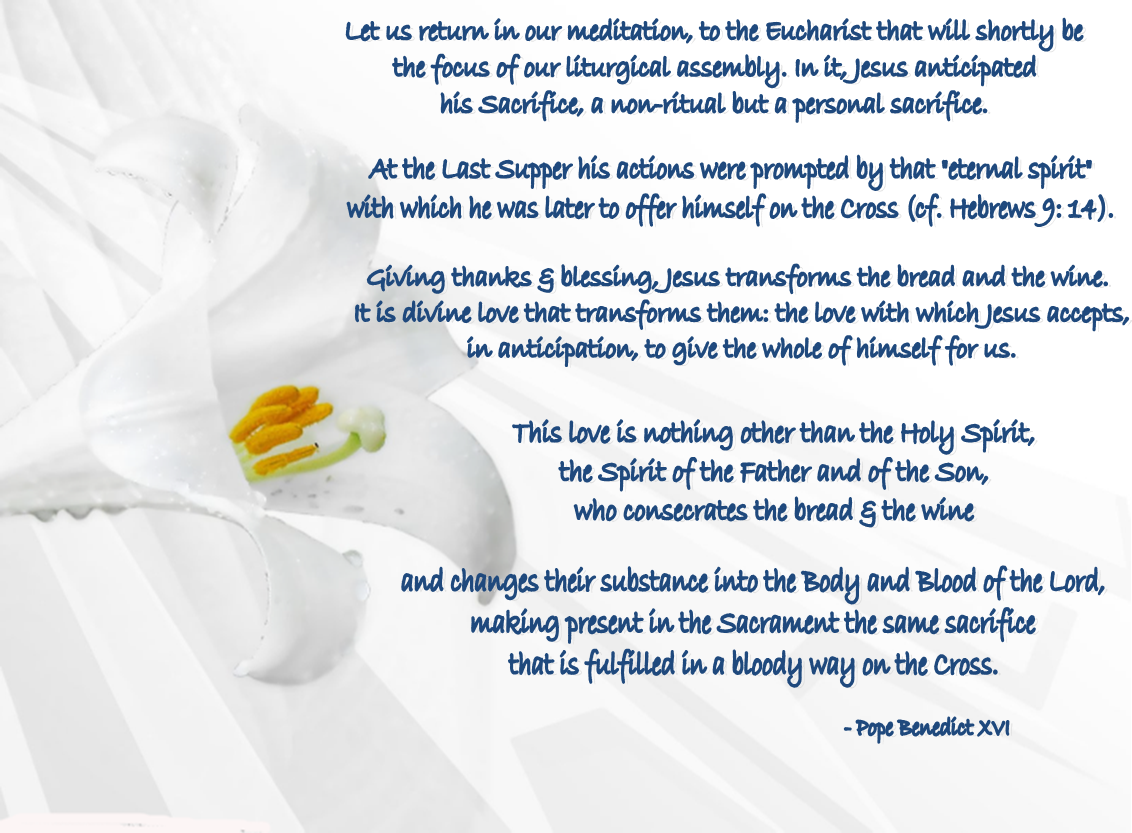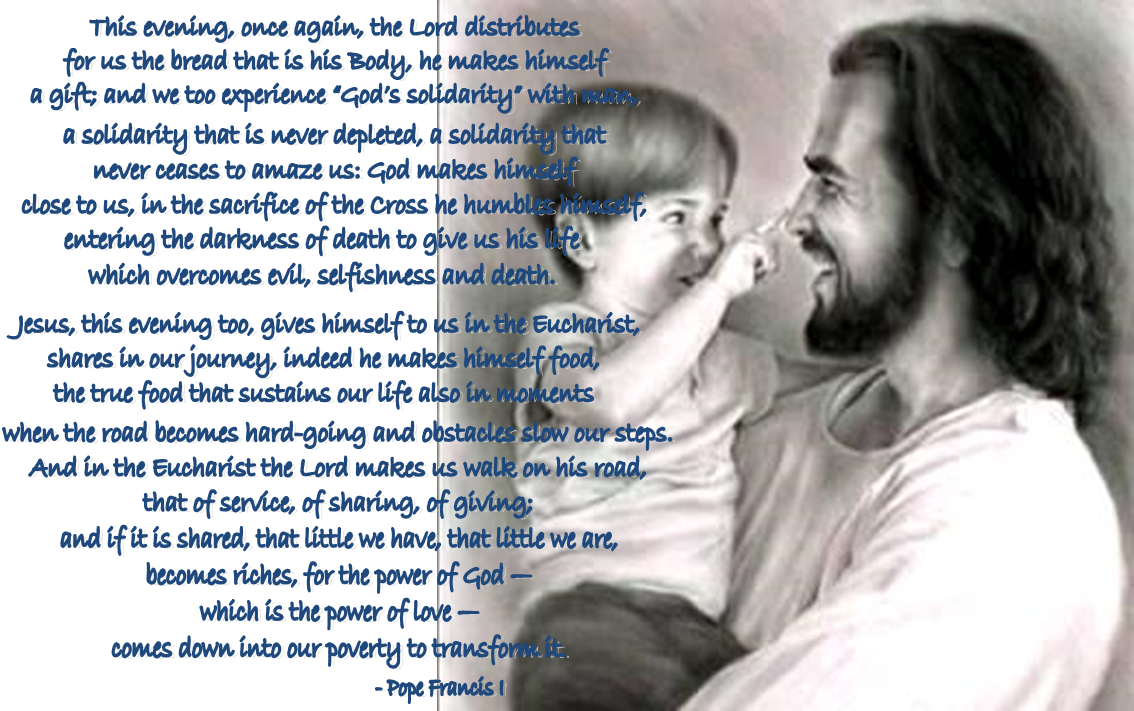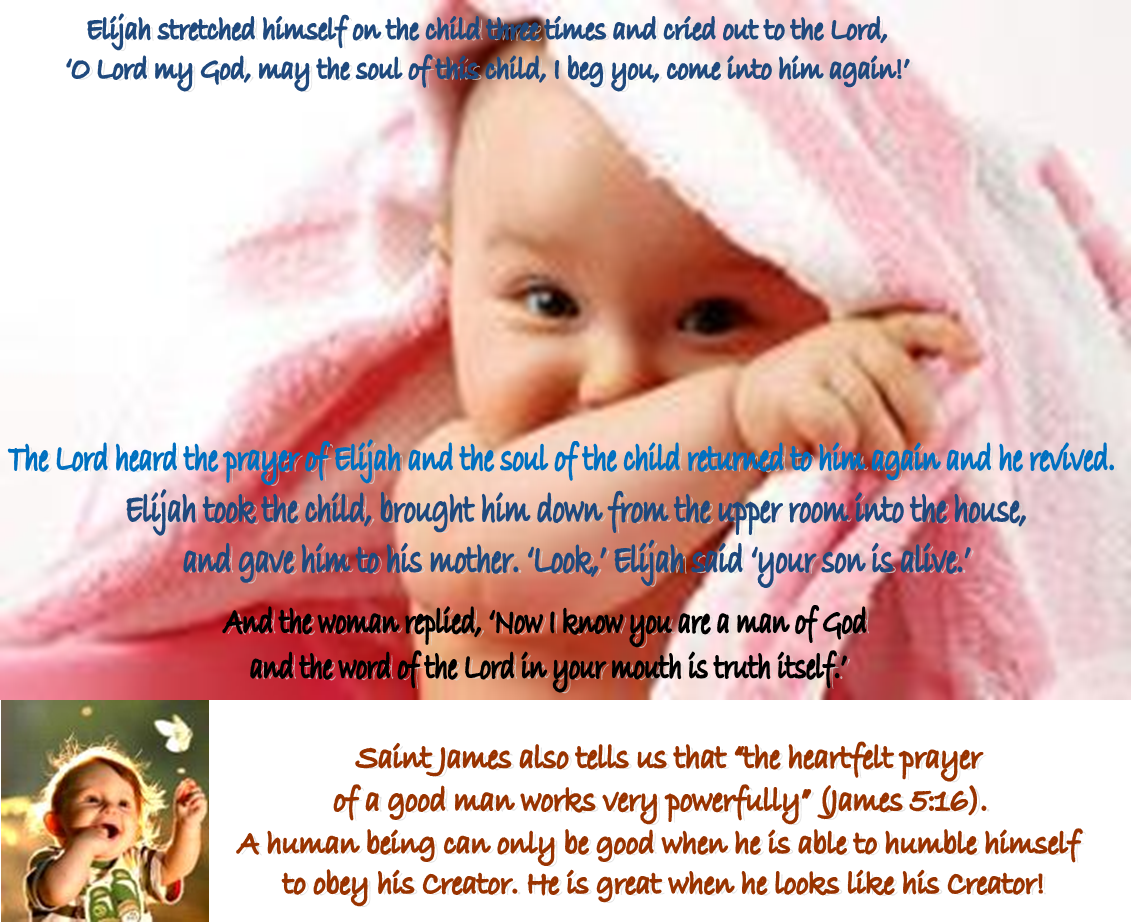|
12 |

|
The Letter to the Hebrews says that Jesus "was heard". In what sense? In the sense that God the Father liberated him from death and restored him to life. He was heard precisely because of his total abandonment of himself to the Father's will: God's plan of love could be perfectly fulfilled in Jesus who, having obeyed to the end, to his death on the Cross, became a "cause of salvation" for all who obey him. In other words, he became the High Priest for having taken upon himself all the sin of the world, as the "Lamb of God". It is the Father who confers this priesthood upon him at the very moment in which Jesus passes over from his death to his Resurrection. He is not a priest according to the Mosaic law (cf. Lev 8-9), but "after the order of Melchizedek", according to a prophetic order, dependent only on his special relationship with God.
Let us return to the words of the Letter to the Hebrews which say: "Although he was a Son he learned obedience through what he suffered". Christ's priesthood entailed suffering. Jesus truly suffered and did so for our sake. He was the Son and did not need to learn obedience but we do, we did need to and we always will. Therefore the Son took upon himself our humanity and for our sake he let himself be "taught" obedience in the crucible of suffering, he let himself be transformed by it like the grain of wheat that has to die in the earth in order to bear fruit. By means of this process Jesus was "made perfect" in Greek, teleiotheis. We must pause to reflect on this term because it is very important. It indicates the fulfilment of a journey, that is, the very journey and transformation of the Son of God through suffering, through his painful Passion. It is through this transformation that Jesus Christ became the "high priest" and can save all who entrust themselves to him. The term teleiotheis, correctly translated by the words "made perfect", belongs to a verbal root which, in the Greek version of the Pentateuch, that is, the first five Books of the Bible, is always used to mean the consecration of the ancient priests. This discovery is very valuable because it tells us that for Jesus the Passion was like a priestly consecration. He was not a priest according to the Law but became one existentially in his Pasch of Passion, death and Resurrection: he gave himself in expiation and the Father, exalting him above every creature, made him the universal Mediator of salvation.
Let us return in our meditation, to the Eucharist that will shortly be the focus of our liturgical assembly. In it, Jesus anticipated his Sacrifice, a non-ritual but a personal sacrifice. At the Last Supper his actions were prompted by that "eternal spirit" with which he was later to offer himself on the Cross (cf. Hebrews 9: 14). Giving thanks and blessing, Jesus transforms the bread and the wine. It is divine love that transforms them: the love with which Jesus accepts, in anticipation, to give the whole of himself for us. This love is nothing other than the Holy Spirit, the Spirit of the Father and of the Son, who consecrates the bread and the wine and changes their substance into the Body and Blood of the Lord, making present in the Sacrament the same sacrifice that is fulfilled in a bloody way on the Cross. We may therefore conclude that Christ is a true and effective priest because he was filled with the power of the Holy Spirit, he was filled with the whole fullness of God's love and precisely "in the night on which he was betrayed", precisely, "in the hour... of darkness" (cf. Luke 22: 53). It is this divine power, the same power that brought about the Incarnation of the Word, that transformed the extreme violence and extreme injustice into a supreme act of love and justice. This is the work of the priesthood of Christ which the Church inherited and extended in history, in the dual form of the common priesthood of the baptized and the ordained priesthood of ministers, in order to transform the world with God's love. Let us all, priests and faithful, nourish ourselves with the same Eucharist, let us all prostrate ourselves to adore it, because in it our Master and Lord is present, the true Body of the Jesus is present in it, the Victim and the Priest, the salvation of the world. Come let us exult with joyful songs! Come, let us adore him! Amen.
Acknowledgment: We thank the Vatican Publisher for allowing us to publish the Homily of Pope Benedict XVI, so that it could be accessed by more people all over the world; as a source of God’s encouragements to all of us.
HOLY MASS ON THE SOLEMNITY OF CORPUS CHRISTI HOMILY OF HOLY FATHER FRANCIS Basilica of St John Lateran [Video]
Dear Brothers and Sisters,
In the Gospel we have listened to, Jesus says something that I always find striking: “you give them something to eat” (Luke 9:13). Starting with this sentence I am letting myself be guided by three words; following [sequela], communion, sharing.
1. First of all: who are those who must be given something to eat? We find the answer at the beginning of the Gospel passage: it is the crowd, the multitude. Jesus is in the midst of the people, he welcomes them, he speaks to them, he heals them, he shows them God’s mercy; it is from among them that he chooses the Twelve Apostles to be with him and, like him, to immerse themselves in the practical situations of the world. Furthermore the people follow him and listen to him, because Jesus is speaking and behaving in a new way, with the authority of someone who is authentic and consistent, someone who speaks and acts with truth, someone who gives the hope that comes from God, someone who is a revelation of the Face of a God who is love. And the people joyfully bless God.
This evening we are the crowd of the Gospel, we too seek to follow Jesus in order to listen to him, to enter into communion with him in the Eucharist, to accompany him and in order that he accompany us. Let us ask ourselves: how do I follow Jesus? Jesus speaks in silence in the Mystery of the Eucharist. He reminds us every time that following him means going out of ourselves and not making our life a possession of our own, but rather a gift to him and to others. |

|
2. Let us take another step. What does Jesus’ request to the disciples, that they themselves give food to the multitude, come from? It comes from two things: first of all from the crowd, who in following Jesus find themselves in the open air, far from any inhabited areas, while evening is falling; and then from the concern of the disciples who ask Jesus to send the crowd away so that they can go to the neighbouring villages to find provisions and somewhere to stay (cf. Luke 9:12).
Faced with the needs of the crowd the disciples’ solution was this: let each one think of himself — send the crowd away! How often do we Christians have this temptation! We do not take upon ourselves the needs of others, but dismiss them with a pious: “God help you”, or with a not so pious “good luck”, and if I never see you again…. But Jesus’ solution goes in another direction, a direction that astonishes the disciples: “You give them something to eat”. Yet how could we be the ones to give a multitude something to eat? “We have no more than five loaves and two fish — unless we are to go and buy food for all these people” (Luke 9:13). However Jesus does not despair. He asks the disciples to have the people sit down in groups of 50 people. He looks up to heaven, recites the blessing, breaks the bread and fish into pieces and gives them to the disciples to distribute (cf. Luke 9:16). It is a moment of deep communion: the crowd is satisfied by the word of the Lord and is now nourished by his bread of life. And they were all satisfied, the Evangelist notes (cf. Luke 9:17).
This evening we too are gathered round the table of the Lord, the table of the Eucharistic sacrifice, in which he once again gives us his Body and makes present the one sacrifice of the Cross. It is in listening to his word, in nourishing ourselves with his Body and his Blood that he moves us on from being a multitude to being a community, from anonymity to communion. The Eucharist is the sacrament of communion that brings us out of individualism so that we may follow him together, living out our faith in him. Therefore we should all ask ourselves before the Lord: how do I live the Eucharist? Do I live it anonymously or as a moment of true communion with the Lord, and also with all the brothers and sisters who share this same banquet? What are our Eucharistic celebrations like?
3. A final element: where does the multiplication of the loaves come from? The answer lies in Jesus’ request to the disciples: “You give them…”, “to give”, to share. What do the disciples share? The little they have: five loaves and two fish. However it is those very loaves and fish in the Lord's hands that feed the entire crowd. And it is the disciples themselves, bewildered as they face the insufficiency of their means, the poverty of what they are able to make available, who get the people to sit down and who — trusting in Jesus’ words — distribute the loaves and fish that satisfy the crowd. And this tells us that in the Church, but also in society, a key word of which we must not be frightened is “solidarity”, that is, the ability to make what we have, our humble capacities, available to God, for only in sharing, in giving, will our life be fruitful. Solidarity is a word seen badly by the spirit of the world!
This evening, once again, the Lord distributes for us the bread that is his Body, he makes himself a gift; and we too experience “God’s solidarity” with man, a solidarity that is never depleted, a solidarity that never ceases to amaze us: God makes himself close to us, in the sacrifice of the Cross he humbles himself, entering the darkness of death to give us his life which overcomes evil, selfishness and death. Jesus, this evening too, gives himself to us in the Eucharist, shares in our journey, indeed he makes himself food, the true food that sustains our life also in moments when the road becomes hard-going and obstacles slow our steps. And in the Eucharist the Lord makes us walk on his road, that of service, of sharing, of giving; and if it is shared, that little we have, that little we are, becomes riches, for the power of God — which is the power of love — comes down into our poverty to transform it. So let us ask ourselves this evening, in adoring Christ who is really present in the Eucharist: do I let myself be transformed by him? Do I let the Lord who gives himself to me, guide me to going out ever more from my little enclosure, in order to give, to share, to love him and others?
Brothers and sisters, following, communion, sharing. Let us pray that participation in the Eucharist may always be an incentive: to follow the Lord every day, to be instruments of communion and to share what we are with him and with our neighbour. Our life will then be truly fruitful. Amen.
Acknowledgment: We thank the Vatican Publisher for allowing us to publish the Homily of Pope Francis I, so that it could be accessed by more people all over the world; as a source of God’s encouragements to all of us. 8 June 2013 |
|
15 June 2013 Extracted from the 1st book of Kings- 1 Kings 17:17-24: The son of the mistress of the house fell sick; his illness was so severe that in the end he had no breath left in him. And the woman said to Elijah, ‘What quarrel have you with me, man of God? Have you come here to bring my sins home to me and to kill my son?’ ‘Give me your son’ he said, and taking him from her lap, carried him to the upper room where he was staying and laid him on his own bed. He cried out to the Lord, ‘O Lord my God, do you mean to bring grief to the widow who is looking after me by killing her son?’ He stretched himself on the child three times and cried out to the Lord, ‘O Lord my God, may the soul of this child, I beg you, come into him again!’ The Lord heard the prayer of Elijah and the soul of the child returned to him again and he revived. Elijah took the child, brought him down from the upper room into the house, and gave him to his mother. ‘Look,’ Elijah said ‘your son is alive.’ And the woman replied, ‘Now I know you are a man of God and the word of the Lord in your mouth is truth itself.’
Extracted from Psalm 30:2,4-6,11-13: I will praise you, Lord, you have rescued me.
I will praise you, Lord, you have rescued me and have not let my enemies rejoice over me. O Lord, you have raised my soul from the dead, restored me to life from those who sink into the grave.
Sing psalms to the Lord, you who love him, give thanks to his holy name. His anger lasts a moment; his favour all through life. At night there are tears, but joy comes with dawn.
The Lord listened and had pity. The Lord came to my help. For me you have changed my mourning into dancing: O Lord my God, I will thank you for ever.
|
